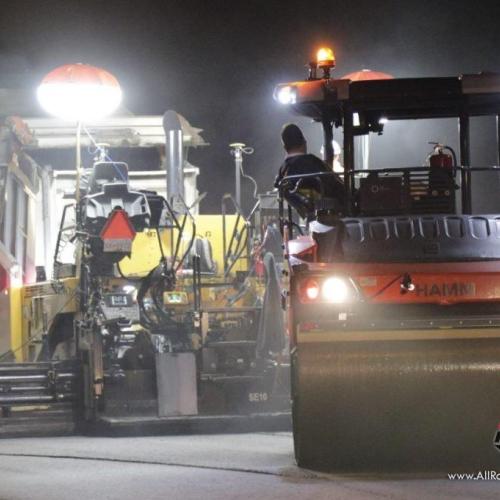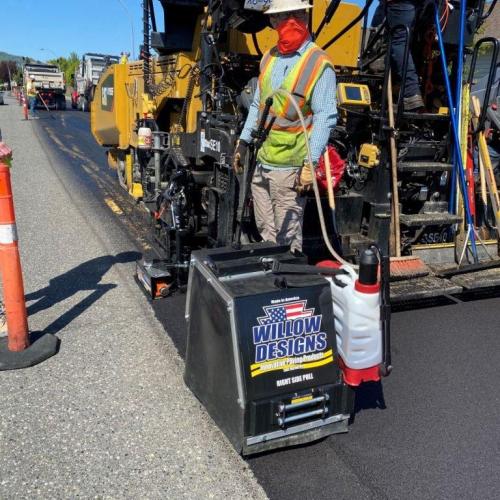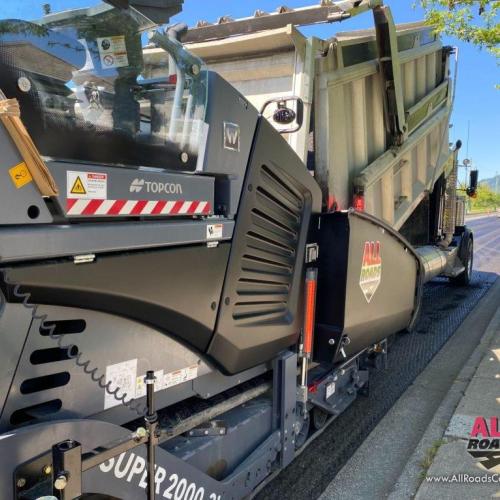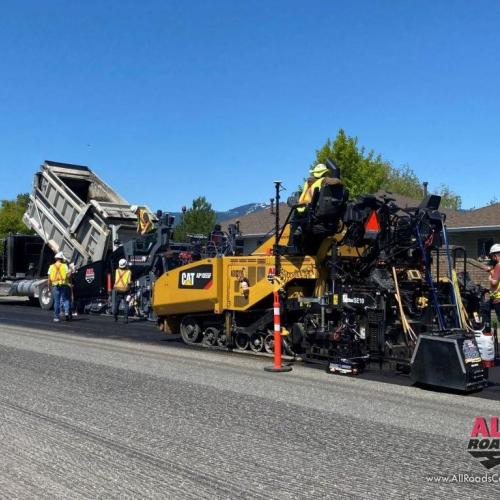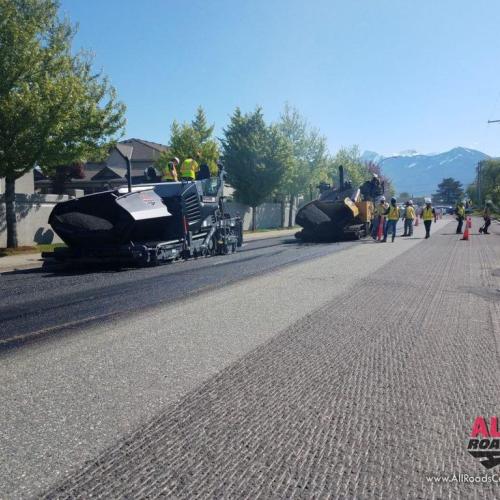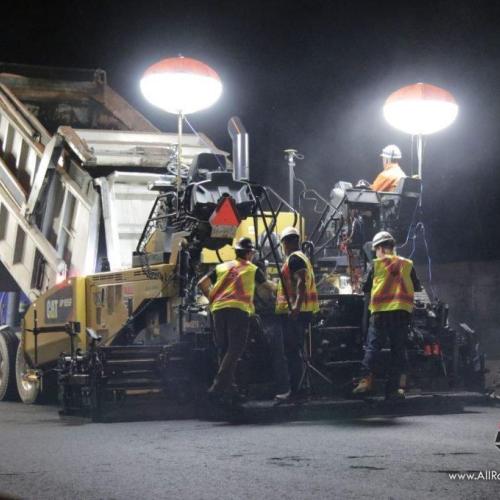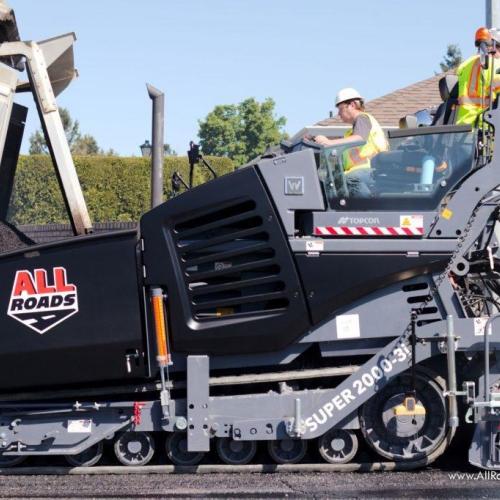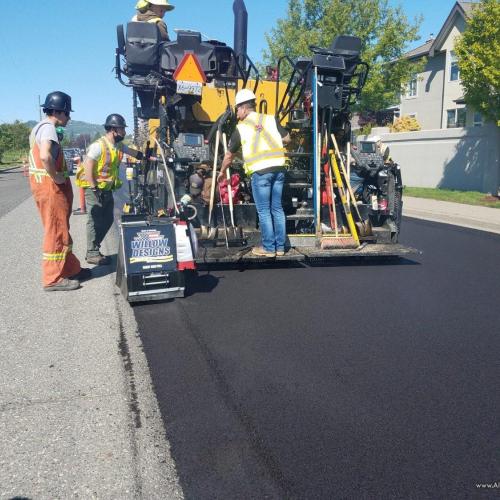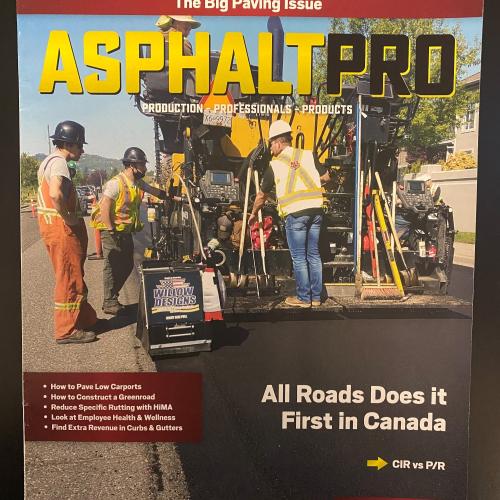All Roads Construction Ltd. Tests Out New Tech
Date Posted : December 1, 2020
by AsphaltPro Staff
in : News and Events
Source: AsphaltPro Magazine
All Roads Construction Ltd., Surrey, British Columbia, embraces new technology and techniques. After two years in business, the Canadian road construction company has built a team of more than 80 employees and established its first asphalt plant in Vancouver. However, the company believes in approaching new technology wisely.
"If you get support from the manufacturers, plan properly, and do a trial run, implementing new technology doesn't have to be difficult," said Denis Labelle, All Roads' operations manager.
That's why they decided to test out a trio of new technologies on a ½-mile mill-and-overlay job on Airport Road in Chilliwack, British Columbia, before deploying them on an upcoming 47-mile job on Canada's Highway 1.
The Airport Road project would be the company's first time using Smoothride, a road resurfacing solution from Topcon Positioning Systems, Livermore, California. It was also All Roads' first time building a notch wedge joint, for which they used the Notch Wedge Safety System from Willow Designs, East Berlin, Pennsylvania. And, it was their first time using a series of new rollers equipped with Intelligent Compaction (IC) technology, from BOMAG Americas, Ridgeway, South Carolina, and HAMM, a Wirtgen Group company, Antioch, Tennessee.
Not only was the Airport Road project a success in its own right and an achievement for All Roads, but it also proved to be a milestone for Canada as the first project in the country to use Smoothride and the first notch wedge joint in British Columbia.
It began when All Roads was strategizing ways to be more efficient on its upcoming highway jobs when they learned about Smoothride. In January, Labelle and All Roads' Superintendent Max Spedding attended a live demo hosted by Topcon.
"I was immediately sold on the technology," Labelle said. "I realized that if we could implement Smoothride, we would not only be more efficient but it would also help us meet the stringent criteria the ministry puts on these projects. There is big bonus money at stake meeting those criteria."
Also in January, Labelle reached out to Jerod Willow at Willow Designs about its Notch Wedge Safety System, hoping the system could improve safety and efficiency installing joints on highway jobs.
"We provided the Ministry of Transportation with a proposal to utilize the Notch Wedge and they were very intrigued with the concept, however would not commit to allowing it without seeing a demonstration," Labelle said.
The company also invested in rollers with IC technology. "We were sure that our production would increase with these new technologies," Labelle said, adding that they were worried their rollers might struggle to keep up while achieving compaction. "We decided to add the IC to help ensure our employees had any tool we could provide that would help us meet these criteria."
Despite All Roads' goal to utilize Smoothride, notch wedge joints and Intelligent Compaction to improve performance on its highway jobs, being able to test the tech on the smaller job would give them an opportunity to learn in a less stressful environment. It also gave the British Columbia Ministry of Transportation a chance to see the technology in action.
There was some apprehension when All Roads presented the use of Smoothride to the ministry for its upcoming Highway 1 job. "The ministry accepted that we wanted to use this technology on the job, but they wanted to see it used in a municipal setting so they could see it in action," Labelle said.
For the second year in a row, All Roads had won the bid for the Chilliwack Paving Program, which is a single bid the municipality lets at the beginning of each year containing all the roads requiring asphalt rehabilitation, line striping, etc. The Airport Road project wasn't part of the original bid, but was added at a later date as part of $1.5 million Canadian of extra work.
When the city added this job to the bid, All Roads had already purchased the new technology and was looking for an opportunity to present it to the ministry.
"It was great to pick up this extra street job [on Airport Road] to test out the new technology and cut our teeth on it," Spedding said.
According to Spedding, the City of Chilliwack is working to increase the number and quality of bike lanes in the area. Airport Road, which is a municipal arterial road running through a predominantly residential area, was an ideal location for such improvements. Despite relatively heavy cycling traffic, Airport Road lacked clear line markings for its bike lanes. Although the structure of the road was sound, its surface had some alligator cracking that the municipality decided to resolve before line striping the bike lanes.
In May, All Roads drove each lane four or five times at regular driving speeds to achieve an accurate scan with Topcon's RD-M1 vehicle-mounted road resurfacing scanner. "You also have to ensure you stagger the passes and avoid overlapping the scan," Labelle said. For the Airport Road job, this process took less than one day.
The LIDAR scanner scans the road up to 100 times per second, collecting data about the road's surface. This information is then put through Topcon's resurfacing software, which converts the data into a 3D model of the road; calculates cross slopes, transitions, yield and more; and can be used to develop a design plan for the surface.
"This technology is so new that we had to learn how to take the information from the scan, import it into the design software and learn how to complete the design," Labelle said. Peter Rontu and Sheraz Ansari, both with All Roads, teamed up with Brandt Positioning and Topcon to complete this design. Due to COVID-19, this training was completed by video and telephone conferencing. "Once the design was completed, we then learned how to upload the design file into both of our pavers."
Although Smoothride could be useful for milling operations, as well, Airport Road required minimal milling. The crew only milled off about 1.5 inches along the curb and at the tie-ins, milling approximately 13 feet from the curb on either side of the road.
They then tacked the surface with SS1 tack and placed a 2-inch overlay with an upper course mix #1 which consists of a 19mm surface course mix design.
The job required 1,500 tons of asphalt, which All Roads purchased from the Lafarge Holcim plant in Sumas, British Columbia.
Shortly after completing the project on Airport Road, All Roads started up its own asphalt plant—the company's first—a 300-ton-per-hour plant from Gencor Industries, Orlando.
According to Labelle, All Roads ordered exactly what the Smoothride design recommended and ended up with only seven tons left over by the end of the job. "That adds up over time," he said. "The tech will pay for itself in the long run."
All Roads President Rod Stephens added that Smoothride also enhanced All Roads' production rates, because the crew doesn't have to worry about application rates and smoothness as much and can focus more on production.
"Smoothride makes paving more proactive," Spedding added. "Normally, you have to look behind the screed and make adjustments, but by that point the problem is already behind you. With Smoothride, the paver knows what it needs to lay and where it needs to lay it."
The crew used echelon paving to pave two lanes of the four-lane road simultaneously, with its Cat 1055 and Vogele SUPER 2000-3i pavers. It attached Willow's Notch Wedge Safety System to their 1055 paver from Caterpillar Inc., Peoria, Illinois, to build a notch wedge joint at the centerline.
According to Labelle, the goal behind All Roads' purchase of the notch wedge system was to save time and materials. He estimates that All Roads will save about 800 tons of mix on its Highway 1 job alone by using a notch wedge joint.
Spedding continued that the Notch Wedge Safety System from Willow Designs made it easy by automating the process. "It's very well-designed, easy to use, and does what they say it does," Spedding said.
All Roads' innovation didn't stop behind the screed. The crew also tried out some new rollers on the Airport Road job: four passes with a Hamm HD 70 double steel drum roller for breakdown rolling, four passes with a a 20-ton BOMAG BW 27 rubber-tire pneumatic roller for intermediate compaction, and an average of four passes with a Hamm HD 70i combination roller for finish rolling.
According to Labelle, All Roads' roller operators were excited to try out intelligent compaction. "They appreciated being able to set the rolling pattern and see where they've hit and what they haven't hit yet," he said.
"The whole goal is to speed up the compaction train," Stephens added. "If the roller gets too far behind because the operator is making needless passes, we have to slow down the paver and our whole production slows down."
The paving portion of the job took two days to complete. The average density on the job was 98.3 percent. "Considering we didn't do any profile milling, patch repair or leveling course, the roadway turned out extremely well," Spedding said.
During the job, representatives from Brandt Positioning and Willow Designs were on-site and the Topcon team was available by conference call to ensure each of their pieces of the puzzle ran smoothly and the crew knew how to use them properly.
"With all the support we had from the manufacturers, everyone settled in with the new technology really quickly," Spedding said. "They let the tech do what it was meant to do and that's why the project was ultimately so successful."
There were also a number of representatives from the British Columbia Ministry of Transportation on the job.
"They were enthralled with the technology we were implementing," Spedding said, adding that they were very impressed with the notch wedge joint. "Being able to create a usable, compacted joint with minimized segregation that doesn't have a propensity to unravel and can be safely crossed over by car or by bike was extremely well received by the audience we had from the Ministry on the Airport Road job."
As a result, the Ministry is changing its specifications to allow for notch wedge joints on its projects. "Once the Ministry saw the notch wedge joint, they were sold on it and decided right away they wanted to see it on our highway job," Labelle added.
The Airport Road job also gave All Roads a chance to demonstrate how Smoothride works, as well as illustrate its benefits and potential cost savings.
"Smoothride is probably the biggest leap forward for our industry," Spedding said. "I have to give kudos to Topcon and Willow for taking the paving industry to the next level with this technology. This is where the industry needs to be so we can provide the general public with the best possible roadways at an efficient cost and volume."
Although the Airport Road job offered no bonuses, a big bonus for All Roads was confidence and experience going into its 53,000-ton Highway 1, which offers bonuses for both rideability and density.
"Being innovators in the industry will only make us more efficient," Labelle said. "The hardest part is convincing people that the technology works." In the case of Airport Road, the proof is in the pavement.
Link
For more information, please visit this website.This technology is so new that we had to learn how to take the information from the scan, import it into the design software and learn how to complete the design. Once the design was completed, we then learned how to upload the design file into both of our pavers.
